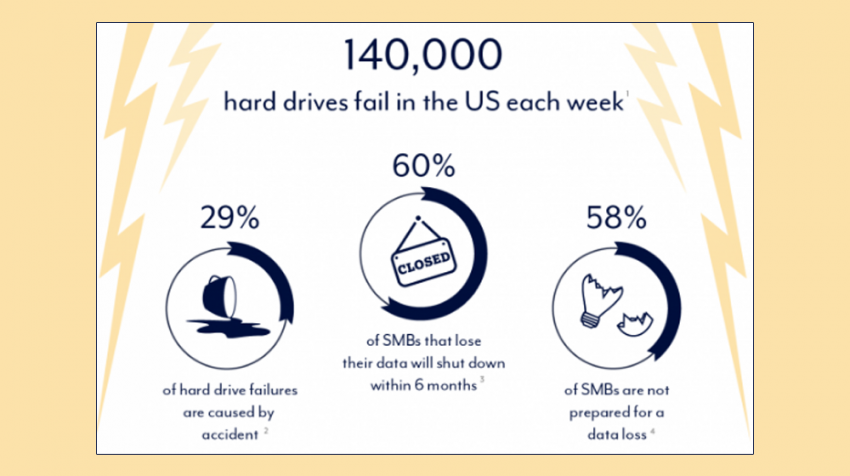Why You Should Always Backup Your Data
Summary: Why backup is important? When it help us? What type of drive we should use to take backup? If these questions are running in your mind then you should read this post to get all your questions answer.
Backup is crucial for data protection. A regular data backup—preferably daily or weekly—saves your important files from inevitable data loss situations due to common events such as system crash, malware infection, hard drive corruption and failure, etc.
According to a survey by BackBlaze, the percentage of users who back up their data has increased steadily from 65% in 2008 to 76% in 2018. However, a major chunk i.e. 43% users still rely on yearly backups.
The time gap between the yearly backups is significant which makes the backups obsolete. As a result, the yearly backups often fail to restore all required files after data loss.
What’s worrying is that 24% of users don’t even think about creating a backup. And the number of users who back up daily is a mere 6%.
Did you know: The average cost of a lost file per individual is estimated to be $141—as per Varonis.
Why You Should Always Backup—Importance of Data Backups
- Data Security
Backups keep your important files safe and secure from data loss. You can also encrypt the backup file or the storage media for added security.
- Easy Recovery
Backup is the most reliable, easiest, and the safest way to restore your lost files after data loss. A regular backup can get back up to 100% files without much effort. However, files created, updated, or added to the system between backup cycles won’t be restored. For that, you need a data recovery software.
- Saves Business
Data is the most important asset for business. A study shows that 60% business can’t survive even 6 months after data loss. With regular backup, one can ensure data security and business continuity in the event of data loss.

- Peace of Mind
When you take regular backups or automate the backup tasks, it gives you a sense of data security. And thus, you don’t have to worry about various factors that often lead to data loss.
- Saves Time & Money
Backup saves a significant of resources that you would otherwise need to spend on restoring the lost data. With proper backups, the restoration process is easy and effortless. Otherwise, you may need to spend several days or weeks to get back your lost data with the help of a professional data recovery service.
Where Do You Stand?
Clearly, you can ask yourself and already know the answer. If you are taking daily or weekly backups, you will be unaffected by most data loss situations. Monthly backups can also work, depending on your system usage pattern. However, yearly backups can turn out obsolete when you need to restore the data—this can result in significant loss of data.
On the other hand, if you take backups more frequently, you will have the latest copies of your important files.
How to Back Up Your Data–Data Backup Methods
To start with, decide the frequency of backup based on the following factors:
- How often do you update or change files
If you update or add files to your system more frequently, consider daily backups. Otherwise, you can back up your files weekly or monthly. For instance, if you are into video editing or a photographer, you need to back up your projects, RAW footages, and photos at the end of the day.
- Importance of your data
The importance of data also plays a key role in deciding the frequency of backup. When data is important, you must backup immediately. For instance, a designer who creates graphics, need to perform daily backups.
Once you know how often you need to perform a backup of your data, time to choose the backup media. Generally, an external hard drive is used as a backup media. However, it’s important to note that backup drive may also fail or get corrupt due to environmental factors, improper use and handling, or mechanical damage.
Briefly, you should backup your backup files as well! Use cloud storage, as they are now more affordable, secure, and reliable. Cloud storage providers such as Google Drive, One Drive also provide utilities that can help you automate the backup tasks.
So if you forget to back up your files at the end of the day, a copy of your files will be automatically saved at your desired cloud storage. Besides, you can access your cloud backup from anywhere in the world.
Also, if the data is business critical, consider the 3-2-1 backup plan. It states that,
Create at least 3 backups in 2 different storage media (hard disk, SSD or flash drives, etc.) with at least 1 backup stored offsite.
This simple but effective backup plan is followed by many organizations and professional as it keeps the data safe in almost all data loss situation whether it’s due to human errors, software/hardware failures, malware infections, or natural disasters.
Most importantly, test your backups. People often backup their files and forget about it. However, you must check the backup for data integrity and whether you are able to restore the files as intended. If not, recreate the backup. And never forget to encrypt the backup drive for data protection and from unauthorized access.

Apart from taking regular backups, you should have a contingency plan and include a data recovery software such as Stellar Data Recovery- Standard which helps get back lost and deleted data from corrupt and formatted hard drives.

The DIY data recovery software also recovers files that are lost between the backup cycles or when the backup is unavailable.
All you have to do is just connect the affected media to your computer and in just 3 steps, i.e. Select, Scan, and Recover—get back your lost files.
The Bottom Line
A small incident is enough to wipe off your important data. You should always follow the best practices on data safety, which starts with backup. Always maintain at least one copy of your data on a different storage drive or cloud storage. You can choose to automate the backup process with the help of various backup utilities, or copy your files manually.
The frequency of backups is also important here. You can decide the backup frequency based on the importance of data or how often new files are added or updated on the system. And don’t forget to keep a DIY Data Recovery software such as Stellar Data recovery Standard handy. The software helps in getting immediate recovery of lost and deleted data in the absence of backup.
So don’t wait till a data loss situation arrives; take regular backups and include a data recovery software to ensure a reliable data recovery strategy.

















It’s nice that you mentioned how backups could keep your important files safe and secure from data loss. I was reading some business operations pointers earlier and one tip talked about data backups. It seems backing up essential data is pretty important for any kind of business, and it looks like there are also backup and disaster recovery services now too.
Thanks, for sharing the wonderful info.
Very nice post. I want to suggest that everyone take regular backup and don’t wait till a data loss situation arrives.
Hi
, yes, we should always do a backup as a backup keeps our important files safe and secure from data loss. A regular backup can help us to restore our data with minimal effort. Thanks for sharing such an informative blog.
Yes, I am agree with the author, a backup can saves our life from any catastrophic data loss situations.
Hello Earl,
Thanks for sharing the experience.
I heard somewhere – Backup a day, keeps recovery away. Even I realize its importance after losing my childhood memories in the form of videos & images after system crash.
Hello Dan,
Thanks for sharing the experience. I hope others will backup regularly.